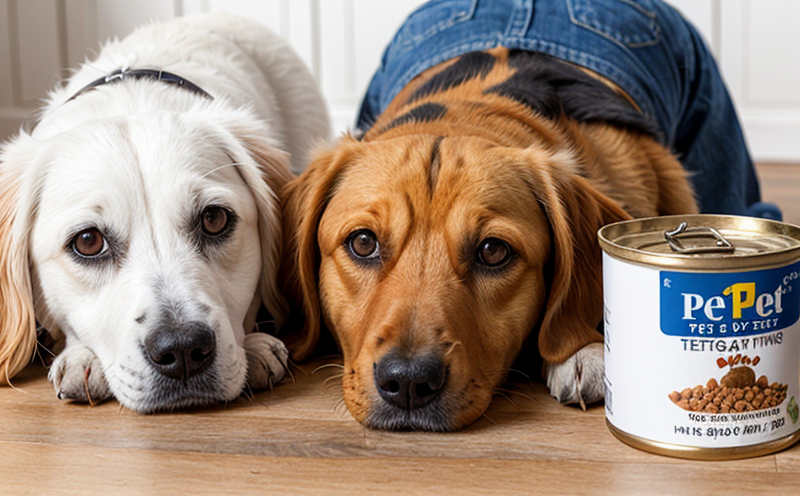ISO 51409 Vitamin C Analysis in Pet Supplements
The analysis of ascorbic acid (vitamin C) in pet supplements is a critical procedure that ensures the accuracy and reliability of product formulations. This service adheres to the stringent requirements outlined in ISO 51409, which provides guidelines for the determination of ascorbic acid in vitamin preparations.
Accurate measurement of vitamin C content is essential because it directly impacts the efficacy of pet supplements. Insufficient levels can result in suboptimal health benefits, while excessive amounts may lead to potential toxicity issues. In this context, ISO 51409 ensures that the analysis method is precise and reproducible.
The testing procedure involves several steps, including sample preparation, instrumental analysis using high-performance liquid chromatography (HPLC), and calibration of standards. The HPLC method allows for accurate quantification by separating ascorbic acid from other components in the supplement formulation. Calibration is performed with known concentrations to ensure that the results are reliable.
The importance of this test cannot be overstated, especially given the diverse range of pet supplements available on the market today. Pet owners and veterinarians rely on consistent quality assurance measures to trust the products they choose for their pets' health. Compliance with international standards like ISO 51409 not only enhances consumer confidence but also ensures regulatory compliance.
The process begins with thorough sample preparation, which involves dissolving the supplement in a suitable solvent and filtering it through a fine filter to remove any particulates or debris that could interfere with the analysis. The filtered solution is then injected into the HPLC system for separation and detection.
Once the sample has been analyzed, the results are interpreted according to the standards specified by ISO 51409. This includes setting acceptable limits for ascorbic acid content based on the intended use of the supplement. For instance, a pet food supplement designed to enhance immune function might require a higher concentration of vitamin C than one aimed at improving skin health.
The accuracy and precision of this test are paramount in ensuring that the final product meets both regulatory requirements and customer expectations. By adhering strictly to ISO 51409, laboratories can provide reliable data that supports informed decision-making by pet food manufacturers and veterinarians.
In summary, the analysis of vitamin C in pet supplements using ISO 51409 is a vital process that guarantees product quality and safety. It plays a crucial role in maintaining consistent performance across batches and ensuring that each unit delivers the expected benefits to pets.
Why It Matters
The accuracy of vitamin C content analysis is critical for pet food manufacturers, as it directly affects the nutritional value and safety of their products. Inadequate levels can lead to underperformance in supporting pets' health needs, while excess can pose risks such as oxidative stress or interference with other nutrients.
ISO 51409 ensures that all tests are conducted using standardized methods, which promotes consistency across different laboratories and regions. This standardization is particularly important given the global nature of pet food trade and the diverse regulatory environments in various countries.
Compliance with ISO standards also enhances consumer trust by ensuring that products meet rigorous quality benchmarks. Pet owners can rely on these tests to make informed decisions about their pets' dietary supplements, knowing they are backed by robust scientific methods.
Why Choose This Test
Selecting ISO 51409 vitamin C analysis offers numerous advantages for pet food manufacturers and quality assurance teams. Firstly, it ensures that all tests adhere to internationally recognized standards, which is essential for regulatory compliance.
The HPLC method used in this service provides high accuracy and precision, allowing for precise quantification of ascorbic acid. This level of detail is crucial for optimizing product formulations and ensuring consistency across different batches.
By choosing this test, manufacturers can enhance their reputation by delivering products that are consistently reliable and safe. Consumers benefit from the trustworthiness and accuracy provided by ISO 51409-compliant analyses.
Use Cases and Application Examples
| Use Case | Description |
|---|---|
| Vitamin C Content Optimization | Determining the optimal concentration of vitamin C for enhancing pets' immune systems. |
| Quality Control Monitoring | Ensuring that all batches of supplements meet specified vitamin C content standards. |
| Label Accuracy Verification | Verifying the label claims regarding vitamin C content to ensure compliance with labeling laws. |
| New Product Development | Evaluating new formulas for their vitamin C content and efficacy in improving pet health. |
| Supplier Audits | Evaluating the consistency of vitamin C content from different suppliers to ensure quality. |
| Regulatory Compliance Checks | Verifying that products meet regulatory requirements for vitamin C content. |
| Pet Health Studies | Supporting research into the role of vitamin C in pet health and wellness. |





